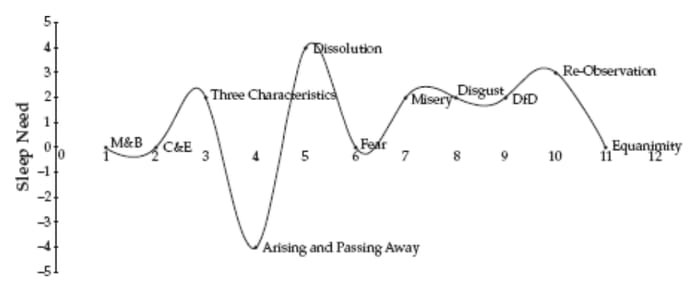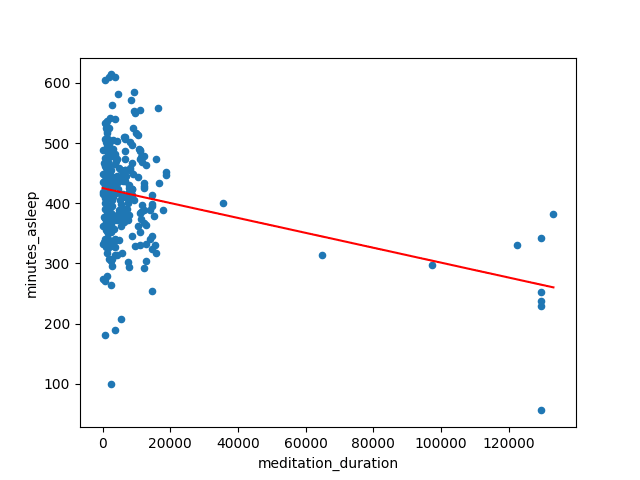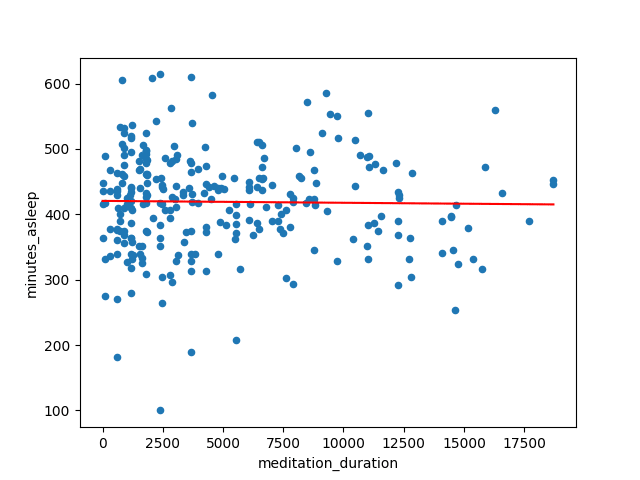Meditation and Reduced Sleep Need
post by niplav · 2025-04-04T14:42:54.792Z · LW · GW · 8 commentsContents
Patra & Telles 2009
Kaul et al. 2010
Analysing my Data
Anecdotes
Inquiry
None
8 comments
Summary: Meditation may decrease sleep need, and large amounts of meditation may decrease sleep need drastically. Correlation between total sleep duration & time spent meditating is -0.32 including my meditation retreat data, -0.016 excluding the meditation retreat.
While it may be true that, when doing intensive practice, the need for sleep may go down to perhaps four to six hour or less at a time, try to get at least some sleep every night.
—Daniel Ingram, “Mastering the Core Teachings of the Buddha”, p. 179
Meditation in dreams and lucid dreaming is common in this territory [of the Arising and Passing away]. The need for sleep may be greatly reduced. […] The big difference between the A&P and Equanimity is that this stage is generally ruled by quick cycles, quickly changing frequencies of vibrations, odd physical movements, strange breathing patterns, heady raptures, a decreased need for sleep, strong bliss, and a general sense of riding on a spiritual roller coaster with no brakes.
—Daniel Ingram, “Mastering the Core Teachings of the Buddha”, p. 275
Need for sleep tends to increase in the Three Characteristics, mostly due to how tiring pain can be. Sleep need can drop dramatically in the stage of the A&P, suddenly peak in dissolution, drop a bit again in Fear as our energy returns, and increase during the Dark Night, mostly due to how mentally fatiguing that stage can be.
—Daniel Ingram, “Mastering the Core Teachings of the Buddha”, p. 379
Note: as far as I know, this chart is not based on any data collected, but on the personal experience of Ingram and his acquaintances.
The interesting thing is that all four of these people within a year or so of having started this practice claimed to have done it, and by “it” I mean eliminated all emotions entirely, replacing them with a perpetually wonderful perception of the freshness of the sensate world, a lack of time pressure, a reduced need for sleep, and some other benefits and odd side effects.
—Daniel Ingram, “Mastering the Core Teachings of the Buddha”, p. 462
The sleep models generally relate to either sleeping less or being awake in some way while asleep. Sleeping less is common during retreats, particularly in some stages such as the A&P. I also know some people who, because of spiritual attainments, have reduced their need for sleep, and this has happened to me at points, but it hasn't been sustained in my case.
—Daniel Ingram, “Mastering the Core Teachings of the Buddha”, p. 470
Patra & Telles 2009
Patra & Telles 2009 test the effects of 22½ minutes of "cyclic meditation" (a type of yoga, together with lying in supine position) on sleep in a sample of n=30 men, and find no effect on sleep duration as recorded by a polysomnograph (352.77±41.35 minutes for yoga and 353.03±35.90 minutes for supine rest), but more time spent in REM and slow-wave sleep. Participants in the intervention group rated their sleep as being longer.
I think this study doesn't tell us very much: They use the term meditation, but are really making their participants do asanas, and I'd guess that participants fall asleep while liying in supine position.
Kaul et al. 2010
Kaul et al. 2010 find that long-term meditators sleep ~2.5h less at 2.3h meditation/day, which suggests that one can reap the benefits of meditation while also increasing the time spent lucid, if one values time in meditation half as much as other waking time.
Analysing my Data
After ~1 year of meditation and sleep tracking, I decided to check my own data for patterns. Full code here.
I load the sleep & meditation data from the same timespan:
sleep=pd.DataFrame(sleep_values)
first_sleep=sleep['date'].min()
last_sleep=sleep['date'].max()
meditations=get_meditations()
meditations.sort_values(by=['meditation_start'], inplace=True)
meditations=meditations.loc[meditations['meditation_start']>(first_sleep-pd.Timedelta('7d'))]
sleep.sort_values(by=['start_time'], inplace=True)
I then generate the list of days for which to check the subsequent sleep and the preceding meditation:
checkpoints=pd.DataFrame()
checkpoints['checkpoint']=pd.date_range(start=first_sleep, end=last_sleep, freq='1d')+pd.Timedelta('18h')
For each day at 18:00, I compute the amount of time slept in the next 24 hours:
aggregated=pd.merge_asof(sleep, checkpoints, left_on='start_time', right_on='checkpoint', direction='backward')
aggregated=aggregated[relevant_sleep_cols+['checkpoint']].groupby('checkpoint').sum()
aggregated.reset_index(inplace=True)
And add the time meditated:
aggregated=pd.merge(aggregated, meditations, how='cross')
aggregated=aggregated.loc[
(aggregated['checkpoint']-aggregated['meditation_end']<pd.Timedelta('4d')) &
(aggregated['checkpoint']-aggregated['meditation_end']>pd.Timedelta('0d'))]
aggregated=aggregated.groupby('checkpoint').agg({'meditation_duration': 'sum'} | {col: 'min' for col in relevant_sleep_cols})
Finally, let's create a dataset without the meditation retreat data:
no_outliers=aggregated.loc[aggregated['meditation_duration']<8*3600]
Resulting scatterplots with linear regressions are:
>>> field='minutes_asleep'
>>> np.corrcoef(aggregated['meditation_duration'], aggregated[field])
array([[ 1. , -0.32231845],
[-0.32231845, 1. ]])
>>> np.corrcoef(no_outliers['meditation_duration'], no_outliers[field])
array([[ 1. , -0.01685158],
[-0.01685158, 1. ]])
The outlier data is mainly from a single Goenka retreat, which have a sleep schedule that almost doesn't overlap with my natural sleep schedule, so there's some significant data contamination here. I still think that the reduced sleep at the time didn't have a strong negative effect on me, and my best guess is that that's due to the large amount of meditation I was doing.
Anecdotes
On a 1-month meditation retreat I did I noticed a stark reduction in my sleep time, at ~10 hours of meditation a day I probably slept 5-6 hours a night (I usually sleep ~8 hours if uninterrupted).
I friend of mine with a long-term chronic illness, also a long-term meditator, tells me he sleeps ~6-7 hours per night, at around 2 hours of meditation a day.
Inquiry
If you're a meditator and track your meditation or attend meditation retreats, and have a wearable (like a fitbit, oura ring &c), I'd be highly interested in analyzing your data. More so for intense and/or long meditation retreats.
8 comments
Comments sorted by top scores.
comment by Seth Herd · 2025-04-07T14:24:48.963Z · LW(p) · GW(p)
You mean meditation reduces sleep, right?
Whether or not there's a reduced need or you're just getting less sleep is a matter of anecdote. I find it entirely plausible that meditators are correct that they need less sleep, but the data you crunched don't distinguish. To know if you needed less you'd need to have cognitive and health measures.
Replies from: niplav↑ comment by niplav · 2025-04-07T14:32:44.987Z · LW(p) · GW(p)
Technically yes, it reduces sleep duration. My best guess is that this is co-occurring with a reduction in sleep need as well, but I haven't calculated this—I only started collecting reaction speed data earlier this year. I could check my fitbit data for e.g. heart rate.
Ideally one'd do an RCT, but I have my hands full of those already.
comment by Mateusz Bagiński (mateusz-baginski) · 2025-04-04T15:00:45.157Z · LW(p) · GW(p)
I wonder whether it's related to this https://x.com/RichardMCNgo/status/1866948971694002657 (ping to @Richard_Ngo [LW · GW] to get around to writing this up (as I think he hasn't done it yet?))
Replies from: niplav↑ comment by niplav · 2025-04-04T15:02:33.833Z · LW(p) · GW(p)
Yeah, there's also reports on Tai Chi doing the same, see @cookiecarver's report.
comment by Kabir Kumar (kabir-kumar) · 2025-04-14T21:27:54.162Z · LW(p) · GW(p)
Could it be that meditation is doing some of the same job as sleep? I'd be curious what the amount of time spent meditating vs amount of sleep need reduced.
Could also reduce unrest/time waiting to sleep.
comment by Jonas Hallgren · 2025-04-05T06:12:48.892Z · LW(p) · GW(p)
Looking back at retreat data from my month long retreat december 2023 from my oura I do not share the observations in reduced sleep meed that much. I do remember needing around half an hour to an hour less sleep to feel rested. This is however a relatively similar effect to me doing an evening yoga nidra right before bed.
In my model, I've seen better correlation with stress metrics and heart rate 4 hours before bed to explain this rather than the meditation itself?
It might be something about polyphasic sleep not being as effective as my oura thinks I go into deep sleep sometimes in deep meditation so inconclusive but most likely a negative data point here.
Replies from: niplav↑ comment by niplav · 2025-04-07T14:34:38.298Z · LW(p) · GW(p)
Interesting! Are you willing to share the data?
It might be something about polyphasic sleep not being as effective as my oura thinks I go into deep sleep sometimes in deep meditation so inconclusive but most likely a negative data point here.
I'm pretty bearish on polyphasic sleep to be honest. Maybe biphasic sleep, since that may map onto some general mammalian sleep patterns.


